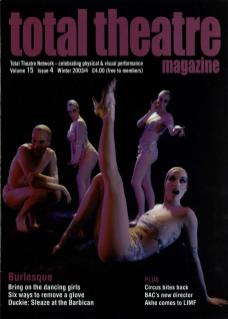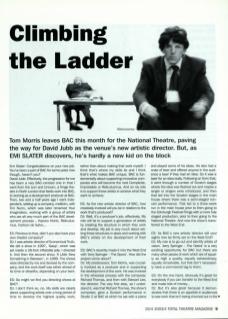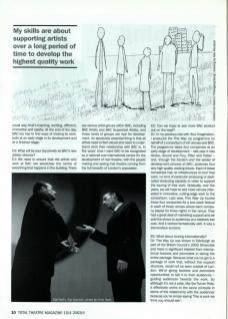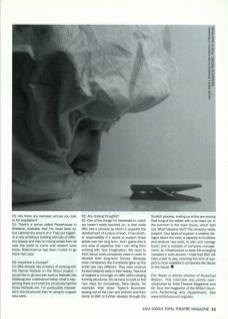Emi Slater: Congratulations on your new job. You've been a part of BAC for some years now though, haven't you?
David Jubb: Effectively, the progression for me has been a very BAC-centred one in that I went from the Lion and Unicorn, a fringe theatre in North London that feeds work into BAC, to working as a development producer at BAC. Then, two and a half years ago I went independent, setting up a company, me&him, with Tim Nunn, which was later renamed Your Imagination, working with a group of artists who are all very much part of the BAC development process – Kazuko Hohki, Ridiculusmus, Cartoon de Salvo...
ES: Previous to that, didn't you also have your own theatre company?
DJ: I was artistic director of Economical Truth. We did a show in 1997, Gasp, which was set inside a 26-foot inflatable jelly. I directed it. And then the second show, A Little Sexy Something in Between, in 1999. The shows were directed by me and devised by the company, and the work itself was either ahead of its time or dreadful, depending on your bent.
ES: So might we find you directing shows at BAC?
DJ: I don't think so, no. My skills are clearly about supporting artists over a long period of time to develop the highest quality work, rather than about making that work myself. I think that's where my skills lie and I think that's what makes BAC unique. BAC is fundamentally about supporting innovative companies who will become the next Complicite, Improbable or Ridiculusmus. And so my role is to support those artists to achieve what they want to achieve.
ES: As the new artistic director of BAC, how creatively involved will you be in relation to the work that's produced?
DJ: Well, it's a producer's job, effectively. My role will be to support a generation of artists by creating the structure in which they work and develop. My job is very much about setting those structures in place and working with BAC's artists on the development of their work.
ES: BAC's recently made it into the West End with Jerry Springer - The Opera. How did the project come about?
DJ: My predecessor, Tom Morris, was crucially involved as a producer and in supporting the development of the work. He was involved in the rehearsal process with the composer, Richard Thomas, and then with Stewart Lee, the director. The very first step, as I understand it, was that Richard Thomas, the show's composer, gave a Scratch performance in Studio 2 at BAC at which he sat with a piano and played some of his ideas. He also had a crate of beer and offered anyone in the audience a beer if they had an idea. So it was a beer for an idea really. Following on from that, it went through a number of Scratch stages where the idea was fleshed out and maybe a singer or singers were introduced, and then that led into the Scratch stages in the main house where there was a semi-staged concert performance. That led to a three-week run in the main house prior to then going to the Edinburgh Festival Fringe with a more fully staged production, prior to then going to the National Theatre. And now the show's transferred to the West End.
ES: As BAC's new artistic director will your sights now be firmly set on the West End?
DJ: My role is to go out and identify artists of vision. Jerry Springer - The Opera is a very exciting opportunity for BAC but there are many other pieces of work which are of equally as high a quality, equally extraordinary, equally remarkable, but that don't necessarily have a commercial tag to them.
ES: On the one hand, obviously it's great for everybody if you can transfer to the West End and make lots of money...
DJ: But it's also great because it demonstrates that there is an appetite in audiences to see work that isn't being churned out in the usual way, that's inspiring, exciting, different, innovative and sparky. At the end of the day, BAC too has to find ways of sharing its work, both at an early stage in its development and at a finished stage
ES: What will be your top priority as BAC's new artistic director?
DJ: We need to ensure that the artists who work at BAC are absolutely the centre of everything that happens in the building. There are various artist groups within BAC, including BAC Artists and BAC Supported Artists, and those kinds of groups are ripe for development. An absolutely essential thing is that all artists need to feel valued and need to understand what their relationship with BAC is. In five years' time I want BAC to be recognised as a national and international centre for the development of new theatre, with the people making and seeing that theatre coming from the full breadth of London's population.
ES: Can we hope to see more BAC product out on the road?
DJ: In my previous role with Your Imagination, I produced the This Way Up programme on behalf of a consortium of UK venues and BAC. The programme takes four companies at an early stage of development – last year it was Gecko, Sound and Fury, Filter and Patter – and, through the Scratch and the ladder of development process at BAC, produces four very high quality, exciting shows. Each of these companies has no infrastructure to tour that work, no kind of particular producing or dedicated producing capacity in order to support the touring of that work. Gradually, over the years, we will hope to add more venues interested in innovative, cutting-edge work to the consortium. Last year, This Way Up toured those four companies for a two-week festival in each of those venues where each company played for three nights in the venue. They had a great deal of marketing support and we sold the shows to audiences at a relatively low cost. And it worked fantastically well. It was a tremendous success.
ES: What about touring internationally?
DJ: This Way Up was shown in Edinburgh as part of the British Council's 2003 Showcase and there is significant interest from international bookers and promoters in taking the entire package. Because what you've got is a package of work that, without this support structure, would not be seen outside of London. We're giving bookers and promoters opportunities to sell it to their audiences – guiding audiences towards the work. So although it's not a prize, like the Turner Prize, it effectively works to the same principle in terms of the relationship with the audiences because you're simply saying ‘This is work we think you should see.’
ES: Are there any overseas venues you look to for inspiration?
DJ: There's a venue called Powerhouse in Brisbane, Australia, that I've never been to, but I admire the sound of it. They put together a very ambitious building with lots of different spaces and they're inviting artists from all over the world to come and present work there. Ridiculusmus has been invited to go there next year.
ES: Anywhere in Europe?
DJ: BAC already has a history of working with the Vienna Festival on the Shout project. I would like to go and see work in festivals like Salzburg and understand better what's happening there and what the structures behind those festivals are. I'm particularly interested in the structures they're using to support new work.
ES: Any closing thoughts?
DJ: One of the things I'm interested in, which we haven't really touched on, is that while BAC has a process by which it supports the development of a piece of work, it has another responsibility if it wants to support those artists over the long term. And I guess this is one area of expertise that I can bring from working with Your Imagination. We need to think about what companies need in order to develop their long-term futures. Because when companies like Complicite grew up the world was very different. They were revenue funded relatively early in their history. That kind of support is no longer on offer within existing funding structures. So we have to work to find new ways for companies. Take Gecko, for example; their show Taylor's Dummies sprang out of the Lion and Unicorn and then came to BAC to further develop through the Scratch process, ending up at the pre-touring final rung of the ladder with a six-week run in the summer in the main house, which sold out. What happens next? The company needs support. Four types of support: a creative dialogue about the work; a capacity to fundraise and produce new work; to plan and manage tours; and a rock-bed of company management, an infrastructure to base the emerging company's work around. I hope that BAC will have a part to play, ensuring this kind of support is more available to companies like Gecko in the future.
Emi Slater is artistic director of Perpetual Motion. This interview was jointly commissioned by Total Theatre Magazine and On Tour, the magazine of the British Council's Performing Arts Department. See www.britishcouncil.org/arts



